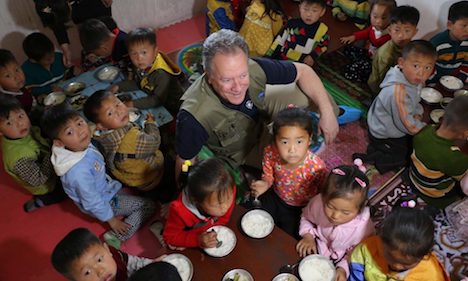N Korea must be getting dizzy trying to follow what the US is thinking
 Print This Print This
By Andrew Salmon | Asia Times
Asia Times
Tuesday, Aug 7, 2018
Security Council backs US plan for humanitarian aid in North Korea
Move is a rare conciliatory gesture from Washington toward Pyongyang
 |
| David Beasley, head of the World Food Programme visits a WFP-supported children’s nursery in Komchon Ri village in North Korea on May 9, 2018. Photo: WFP/Silke Buhr |
The United Nations Security Council agreed on Monday to a series of guidelines that would ease the entry of humanitarian aid into North Korea, the world’s most heavily sanctioned country.
The guidelines, which would accelerate the review of aid items past and via the UN Sanctions Committee, were drafted by the United States – previously the most hawkish member of the UNSC when it came to North Korea.
The US proposal underwent weeks of negotiation, according to AFP reports from the United Nations, before it won support on Monday.
Dutch Deputy UN Ambassador Lise Gregoire-van Haaren, whose country chairs the UNSC Sanctions Committee, said the guidelines would hopefully “provide clarity on delivering humanitarian aid to the North Korean people without violating sanctions.”
Committee to explain its decision
A notice will be sent to the UN’s 193 member-states by the committee “to provide a clear explanation” of the procedure for exemptions which will “improve the delivery of humanitarian assistance” to North Korea, a committee document said, AFP reported.
North Korea has complained – most recently at the ASEAN Regional Forum in Singapore last weekend – that its conciliatory gestures are not being reciprocated by the United States. In recent months, Pyongyang has announced a missile and nuclear test moratorium, blown up tunnel entrances at its underground nuclear test side, started dismantling a satellite launch station, as well as handed over sets of apparent US war remains.
While North Korea seeks a phased, reciprocal denuclearization process, the US has stated that UNSC sanctions must remain in place until denuclearization has taken place.
There has, as yet, been no response to Monday’s US-initiated gesture by North Korea.
“The guidelines were issued were announced to clearly organize the relevant procedures such as giving exemptions to humanitarian work in order to smoothly implement humanitarian aid,” a spokesperson at Seoul’s Foreign Ministry told Asia Times.
She noted that aid organizations seeking to assist North Korea faced “some difficulties, even in the process of carrying out humanitarian work, which is exempt from sanctions,” due to the multiplicity of sanctions, and related complexities.
The move may enable a large tranche of South Korean aid to reach the North in the near future.
Last year, the government earmarked US$8 million to purchase aid, such as food products and vaccines, but amid security tensions, was unable to deliver it, an unnamed South Korean official told South Korea’s Yonhap news agency.
“The provision of $8 million is what our government has promised,” the official told Yonhap. “It’s expected to pick up speed going forward.”
While Washington concentrates on denuclearization, Seoul has been pressing ahead with a variety of inter-Korean activities, such as cultural and sport exchanges and military talks, as it seeks to upgrade détente on the peninsula.
Half population is malnourished
Starvation is no longer considered a major risk in North Korea, but almost half the population suffers from malnutrition to some degree, according to the UN.
The nation also suffers from a shortage of medicine and medical technologies.
Moreover, the current heatwave is having an impact on North Korean crops, and in a country that suffers from sanctioned power imports, air conditioning is a luxury few can enjoy, exacerbating the scorching temperatures, South Korean TV news programs have reported.
Source URL
|
 Print This Print This

|

